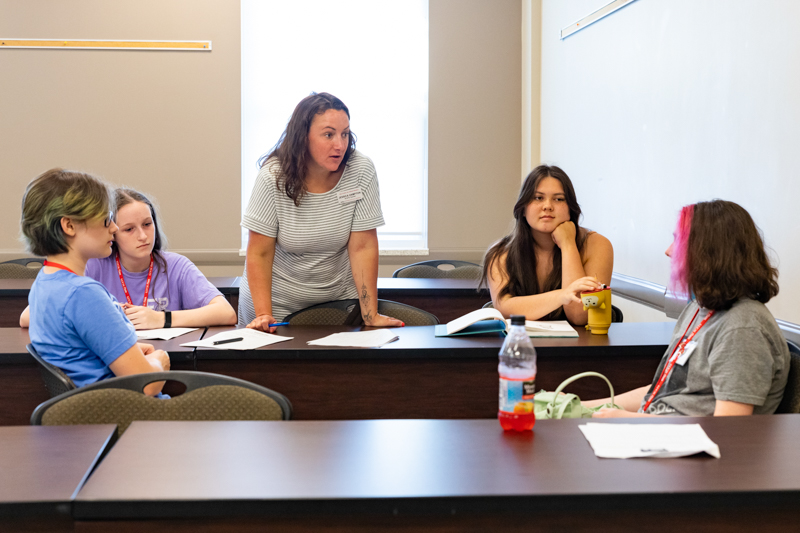
By The Duke Talent Identification Program
What is leadership? It involves persuading others to set aside their individual concerns, at least for a time, and pursue a goal that is important to the group. Leadership occurs only when others embrace the leader’s vision and the group’s goals as their own.
Much has been written on this topic. Most readers are familiar with leadership behaviors such as planning, organizing, clarifying, motivating, supporting, managing conflict, team building, networking, delegating, rewarding. . . . The list goes on and on. However, there is little published research documenting what effective leaders actually do.
Individuals vary considerably in leadership ability, just as they do in intellectual, academic, creative, artistic, and other abilities. Five well-researched personality factors associated with successful leadership are sociability, cooperativeness or diplomacy, integrity, emotional stability, and intelligence. The trait of intelligence has helped establish leadership as a type of giftedness.
The challenge for educators and parents is to figure out how best to encourage and nurture leadership at an early age. All children, intellectually gifted or not, can improve their leadership skills. However, this will not ensure that all children will become effective leaders.
The following ten effective leadership skills were gathered from firsthand observation of gifted children:
- acting responsibly in social situations
- accurately reading the feelings of others
- displaying good social judgment
- projecting a confident (but not arrogant) self-image
- motivating others
- getting along with others, including those one doesn’t like
- instilling trust and confidence in others
- showing flexibility and comfort with divergent points of view
- speaking well in front of others
- demonstrating social savvy, including respect for authority, rules, and social conventions
With these skills in mind, you can begin to identify and select activities at the school, around the home, and in the community that allow your child to practice and refine leadership. Here are four ideas recommended for gifted adolescents:
- Books, television, and film afford wonderful opportunities for reading about and discussing examples of leaders. For instance, it is instructive to read books such as Make It So: Leadership Lessons from “Star Trek: The Next Generation.” Many fictional characters provide poignant examples of effective and ineffective leadership.
- Volunteer work offers gifted youth the opportunity to observe, model, and practice leadership skills in real-life settings. Volunteering at hospitals, child care facilities, hospice centers, churches, synagogues, government agencies, libraries, and the like helps them appreciate how different groups function in the real world.
- Mentoring relationships with community leaders also introduce gifted youth to real-world leadership experiences. Principals, ministers, rabbis, government officials, police and fire department officers, and heads of nonprofit organizations, to name a few, are often willing to mentor responsible adolescents. But be advised that your child will need to be a skillful interviewee to secure this kind of experience. Mentoring differs from volunteering primarily by enabling the youngster to pursue a project of personal interest under guided supervision.
- Summer leadership courses designed for gifted students, such as those offered by university talent searches and other precollege programs, are intensive, residential programs intended for youth committed to a rigorous classroom and service-learning experiences.
Leadership calls for skills that can be developed and enhanced. Whether or not they ultimately become successful leaders, all gifted children can cultivate leadership skills that will make a real difference in how successful they are in life.
—Steven I. Pfeiffer, PhD, ABPP
Steven I. Pfeiffer, former director of the Duke University Talent Identification Program, is a professor in the Psychological Services in Education Program, coordinator of the Mental Health Counseling Program, and director of clinical training in the doctoral program in counseling psychology and school psychology at Florida State University. He has worked with gifted children for over 25 years and counsels them and their families in limited private practice.
Suggested Reading
- “Leadership,” guest-edited by Julia L. Roberts, special issue of Gifted Child Today, vol. 27, no. 1, 2004
- Early Gifts: Recognizing and Nurturing Children’s Talents, edited by Paula Olszewski-Kubilius, Lisa Limburg-Weber, and Steven I. Pfeiffer, Prufrock, 2003 (see chaps. 1 and 10)
- Leadership Development in Gifted Students, by Frances A. Karnes and Suzanne M. Bean, ERIC EC Digest no. E485, 1990
